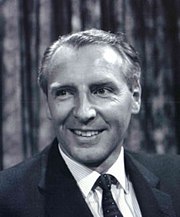Brian Cleeve
| Brian Cleeve | |
|---|---|

Brian Cleeve in 1962
|
|
| Born |
Brian Brendon Talbot Cleeve 22 November 1921 Southend, Essex, England |
| Died | 11 March 2003 (aged 81) Shankill, Dublin, Ireland |
| Occupation | Writer broadcaster |
| Years active | 1945–2001 |
Brian Brendon Talbot Cleeve (22 November 1921 – 11 March 2003) was a prolific writer, whose published works include twenty-one novels and over a hundred short stories. He was also an award-winning broadcaster on RTÉ television. Son of an Irish father and English mother, he was born and raised in England. He lived in South Africa during the early years of National Party rule and was expelled from the country because of his opposition to apartheid. In his early thirties he moved to Ireland where he lived for the remainder of his life. In late middle age he underwent a profound spiritual experience, which led him to embrace mysticism. He developed a model for the spiritual life based on the principle of obedience to the will of God.
Brian Cleeve was born in Southend-on-Sea, Essex, the second of three sons to Charles Edward Cleeve and his wife Josephine (née Talbot). Josephine was a native of Essex, where her family had lived for generations. Charles Cleeve, who was born in Limerick, Ireland, was a scion of a famous and wealthy family that ran several successful Irish enterprises in the late-nineteenth and early twentieth centuries. The Cleeves came from Canada originally and emigrated to Ireland in the mid-nineteenth century. As a result of labour troubles and the effects of the Irish Civil War, the Cleeve business failed and Charles moved with his family to England, where Brian was born in 1921.
When he was two-and-a-half, Brian's mother died and his maternal grandparents, Alfred and Gertrude Talbot, took over responsibility for his upbringing. At age eight, Cleeve was sent as a boarder to Selwyn House in Kent, followed at age 12 by three years at St. Edward's School in Oxford. He was by nature a free-thinker and he rejected the assumptions and prejudices that were then part and parcel of upper-middle class English life. His unwillingness to conform meant that school life was very difficult for him, and, in the late summer of 1938, Cleeve decided not to return to St. Edward's for his final year. Instead, he ran away to sea.
...
Wikipedia
